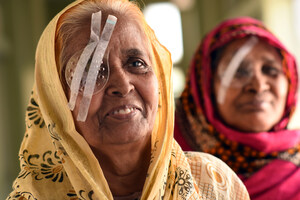Study Finds Autonomous AI Boosts Medical Caregivers' Productivity by 40% in Bangladesh
The new research is the first randomized trial ever to be published on the efficiency gains of autonomous AI
NEW YORK, Nov. 15, 2023 /PRNewswire/ -- Orbis International, Digital Diagnostics, and Deep Eye Care Foundation, Bangladesh, announce new findings demonstrating autonomous AI significantly improves the productivity of medical caregivers testing for diabetic eye disease by 40%. The peer-reviewed randomized controlled trial study, published in Nature, is the first to explore how autonomous AI can enhance the productivity of healthcare professionals globally, allowing them to see more patients while prioritizing those who require their care and expertise. This study, which was conducted in Bangladesh, demonstrates the potential for autonomous AI to increase access to essential services and reduce health inequities, including in low and middle-income countries with shortages of trained specialists.
"An estimated one billion people worldwide lack access to essential health service," said Dr. Munir Ahmed, Country Director, Orbis Bangladesh. "This disparity hinders global economic growth and perpetuates the widening poverty gap. One way to tackle this problem is to increase efficiency and productivity using technology. This study shows that autonomous AI can make accurate medical decisions and improve clinic productivity. The autonomous AI does not take the place of a doctor; rather, it is a tool to better streamline the clinical process."
"Years ago, I had a vision of the impact that autonomous AI would have in healthcare, but quickly found out that vision, validation, and commercial adoption are very different things," said Dr. Michael Abramoff, Principal Investigator of the study and Founder and Executive Chairman of Digital Diagnostics. "Over time I realized the magnitude of getting autonomous AI accepted by all stakeholders so it is widely deployed and can impact patients. Now we finally have robust scientific evidence that autonomous AI is not only improving outcomes, but as this study shows, also improving productivity in healthcare. Seeing my initial vision fully realized through our partnership with Orbis International and Deep Eye Care Foundation using LumineticsCore is validation of everything we have been working toward. We are excited about expanding this collaboration both in Bangladesh and other countries."
This randomized controlled trial took place at retina specialist clinics at Deep Eye Care Foundation in Rangpur, Bangladesh, over five months in 2022. It included over 2,000 patients randomized to an intervention group or a control group. Patients in the control group proceeded to the specialist regardless of autonomous AI results. Patients in the intervention group did not see a specialist during their visit if the autonomous AI did not detect signs of diabetic eye disease and were instructed to return in 12 months; patients only saw a specialist if the autonomous AI detected diabetic eye disease and further treatment was required. The results showed that the autonomous AI resulted in a 40% increase in patients that completed a high-quality eye exam per hour.
The increased productivity of medical professionals demonstrated in the trial resulted in several benefits. Importantly, the specialists reported that the use of autonomous AI allowed them to focus their time on more complex cases that required treatment or otherwise demanded their specialized knowledge. This also meant patients with more straightforward cases were seen more quickly since patients cleared to leave the clinic following an autonomous AI exam did not wait to see a specialist. Patients cleared to leave also reported high satisfaction with the autonomous AI testing process because they saved time. This is especially important as clinic wait times are a major concern for patients in areas of limited resources who often cannot afford to take time away from home and employment responsibilities.
"It's a great opportunity for Deep Eye Care Foundation to be a part of this cutting-edge study, which proves the transformative potential of autonomous AI in healthcare," said Dr. Khairul Islam, Executive Director, Deep Eye Care Foundation. "This study is a significant breakthrough in the field of eye care for the low- and middle-income countries where scarcity of skilled health professionals and facilities are always a hindrance. These challenges can be overcome through integrating autonomous AI, which increases the efficiency and productivity of our doctors and, thus, helps us reach more patients by providing them with timely eye care."
Digital Diagnostics' autonomous AI system used in the study provides medical diagnoses without human oversight and has proven to be more accurate in detecting diabetic eye disease than human specialists i,ii,iii. The autonomous AI system was FDA De Novo-cleared in 2018 and validated for its safety, efficacy, and lack of racial, ethnic, and sex bias in a trial of adults with diabetes at risk for diabetic eye disease iv.
Orbis, Digital Diagnostics, and Deep Eye Care in Bangladesh share a common mission to narrow the global healthcare inequality gap by delivering accessible, high-quality healthcare. Increasing the productivity of the limited cohort of health care workers in low- and middle-income countries is vital in addressing global health disparities. More productive doctors can see and treat more patients who genuinely require their services, directly reducing the number of people who go without care.
About Orbis International
Orbis is a leading global non-governmental organization that has been a pioneer in the prevention and treatment of avoidable blindness and vision loss for over four decades. Orbis transforms lives by delivering the skills, resources and knowledge needed to deliver accessible quality eye care. Working in collaboration with local partners, including hospitals, universities, government agencies and ministries of health, Orbis provides hands-on ophthalmology training, strengthens healthcare infrastructure and advocates for the prioritization of eye health on public health agendas. Orbis operates the world's only Flying Eye Hospital, a fully accredited ophthalmic teaching hospital on board an MD-10 aircraft, and an award-winning telemedicine platform, Cybersight. For the past ten consecutive years, Orbis has achieved Charity Navigator's coveted four-star rating for demonstrating strong financial health and commitment to accountability and transparency, placing Orbis in the top 3% of U.S. charities. For the past three years, Orbis has earned GuideStar's platinum Seal of Transparency. In 2022, Orbis earned "accredited charity" status from the Better Business Bureau by meeting all 20 of their standards for charity accountability. To learn more, please visit orbis.org.
About Digital Diagnostics
Digital Diagnostics Inc. is a pioneering AI diagnostics company on a mission to transform the quality, accessibility, equity, and affordability of global health care through the application of technology in the medical diagnosis and treatment process. The company, originally founded by Michael Abramoff, MD, PhD, a neuroscientist, practicing fellowship-trained retina specialist, and computer engineer, is led by him and co-founders John Bertrand and Seth Rainford. LumineticsCore™ (formerly IDx-DR) is an FDA-cleared AI-based diagnostic system designed for use at the front lines of care to detect diabetic retinopathy (including macular edema), a common complication of diabetes and a leading cause of blindness. LumineticsCore is cleared by the FDA to make a diagnosis without the need for a clinician to also interpret the image or result, making it usable by health care providers who may not normally be involved in eye care. For more information and the latest news follow: https://digitaldiagnostics.com/
i Abràmoff MD, Lavin PT, Birch M, Shah N, Folk JC. Pivotal trial of an autonomous AI-based diagnostic system for detection of diabetic retinopathy in primary care offices. Nature Digit Med 2018;1:39off Lavin PT, Birch M, Shah N, Folk JC. Pivotal trial of an autonomous AI-based diagnostic system for detection of diabetic retinopathy in primary care offices. Nature Digit Med 2018;1:39 |
MEDIA CONTACT
Jenna Montgomery
Manager, Global Communications and Marketing
[email protected]
Jacque Engle
Digital Diagnostics VP of Marketing
[email protected]
+1-610-761-1886
SOURCE Orbis International

WANT YOUR COMPANY'S NEWS FEATURED ON PRNEWSWIRE.COM?
Newsrooms &
Influencers
Digital Media
Outlets
Journalists
Opted In






Share this article